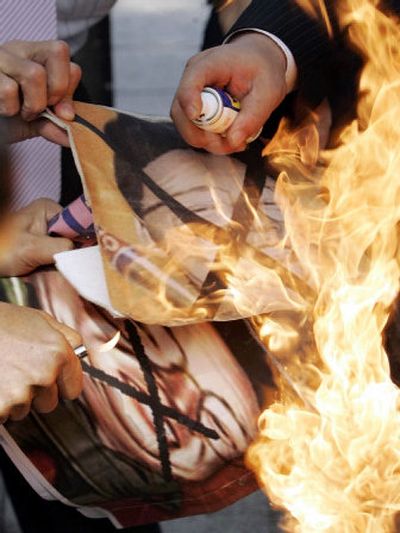U.S. tells North Korea to drop nuclear test

WASHINGTON – The Bush administration delivered a secret message to North Korea on Wednesday warning it to back down from a promised nuclear test, and said publicly that the United States would not live with a nuclear-armed North.
North Korea “can have a future or it can have these weapons. It cannot have both,” Assistant Secretary of State Christopher Hill said Wednesday in remarks at Johns Hopkins University’s U.S.-Korea Institute. It was the toughest response yet from the Bush administration, coming two days after Pyongyang announced plans to conduct its first nuclear test.
Hill did not explain how the administration would respond to a test but said it was willing to sit with North Korean officials and other diplomats from the region to discuss the crisis. “We will do all we can to dissuade (North Korea) from this test,” he said. State Department officials said Hill was trying to arrange a trip to Asia to discuss options with key allies.
“We are not going to live with a nuclear North Korea, we are not going to accept it,” Hill said. He said the United States had passed along a private warning through North Korea’s diplomatic mission to the United Nations in New York.
North Korea is believed to have enough plutonium for as many as 11 nuclear bombs. It announced last February that it had succeeded in building a weapon, although intelligence analysts believe it is still years away from being able to deliver one.
Tuesday’s statement did not set a date for a test. Senior intelligence officers and some administration officials said they had no clear signs indicating when one might occur.
Topographical changes resulting from a test would be visible by U.S. satellites, officials said. It could also be detected by ground-based seismic sensors, some of which are owned by U.S. intelligence and others run by international monitoring stations set up to detect and deter nuclear tests around the world.
Several government analysts suggested a test could come as early as Sunday, the anniversary of Kim Jong Il’s appointment as head of the Korean Workers’ Party in 1997. It may also be timed for a vote at the United Nations on Monday when Ban Ki Moon, South Korea’s foreign minister, is expected to be chosen as the next U.N. secretary-general. In a private call with Secretary of State Condoleezza Rice on Wednesday, Ban offered to mediate between Washington and Pyongyang should he be selected as the next U.N. chief, according to an official briefed on the call.
Bush’s top advisers held an emergency meeting on North Korea Tuesday to review a number of strategies under consideration but came away with little agreement. Officials briefed on the meeting, chaired by national security adviser Stephen Hadley, said participants discussed a range of options under consideration for restarting talks with Pyongyang and coaxing allies such as China and South Korea to adopt a tough line in the face of threats.